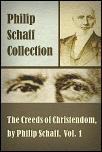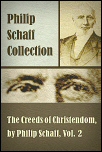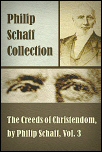The Creeds of Christendom (3 vols.)
Digital Logos Edition
Overview
Philip Schaff was one of the leading historians of the nineteenth century and one of the most public theologians and prominent intellectuals of his time. Schaff played a foundational role in the development of American Protestantism and gained wide recognition as one of the leading experts on matters of theology, history, and biblical studies. He was a widely respected scholar and a prolific writer, and his works were influential in both Europe and America.
Logos offers these great resources and more by Philip Schaff at an amazing discount in the 21-volume Philip Schaff Collection. Also be sure to check out Schaff's History of the Christian Church, Early Church Fathers, and the New Schaff-Herzog Encyclopedia of Religious Knowledge.
This title is included in the following collections
You can save when you purchase this product as part of a collection.
Logos 8 Starter Legacy Library
$39.99$39.99Logos 8 Lutheran Starter Legac...
$39.99$39.99Logos 8 Reformed Starter Legac...
$39.99$39.99Logos 7 Lutheran Starter Legac...
$39.99$39.99
- $39.99
- $39.99
- $39.99
- $39.99
- $39.99
- $89.99
- $89.99
- $89.99
- $89.99
- $89.99
- $89.99
- $89.99
- $89.99
- $89.99
- $89.99
- $89.99
- $89.99
- $136.99
- $199.99
- $349.99$279.99
- $349.99
- $349.99
- $349.99
- $349.99
- $349.99
- $349.99
- $349.99
- $349.99
- $349.99
- $349.99
- $349.99
- $349.99
- $349.99
- $349.99
- $349.99
- $399.99
- $849.99$679.99
- $719.99
- $849.99
- $849.99
- $849.99
- $849.99
- $849.99
- $849.99
- $849.99
- $849.99
- $849.99
- $849.99
- $849.99
- $849.99
- $849.99
- $849.99
- $849.99
- $849.99
- $849.99
- $849.99
- $849.99
- $849.99
- $1,304.21$899.99
- $1,499.99$1,199.99
- $1,499.99
- $1,499.99
- $1,499.99
- $1,499.99
- $1,499.99
- $1,499.99
- $1,499.99
- $1,499.99
- $1,499.99
- $1,499.99
- $1,499.99
- $1,499.99
- $1,499.99
- $1,499.99
- $1,499.99
- $1,499.99
- $1,499.99
- $1,499.99
- $1,499.99
- $1,499.99
- $1,499.99
- $2,999.99$2,249.99
- $2,999.99
- $2,999.99
- $2,999.99
- $2,999.99
- $2,999.99
- $2,999.99
- $2,999.99
- $2,999.99
- $2,999.99
- $2,999.99
- $2,999.99
- $2,999.99
- $2,999.99
- $2,999.99
- $2,999.99
- $2,999.99
- $2,999.99
- $2,999.99
- $2,999.99
- $2,999.99
- $2,999.99
- $2,999.99
- $4,749.99$3,562.49
- $4,749.99$3,562.49
- $4,749.99$3,562.49
- $4,749.99$3,562.49
- $4,749.99$3,562.49
- $15,739.84$4,720.99
- $4,749.99
- $4,749.99
- $4,749.99
- $4,749.99
- $4,749.99
- $4,749.99
- $4,749.99
- $4,749.99
- $4,749.99
- $4,749.99
- $4,749.99
- $4,749.99
- $4,749.99
- $4,749.99
- $4,749.99
- $4,749.99
- $6,399.99$5,439.99
- $5,999.99
- $5,999.99
- $10,999.99$8,249.99
- $11,399.99
- $11,399.99
- $11,399.99
- $11,399.99
- $23,999.99$17,999.99
- $21,749.99
- $24,999.99

- Presents original Greek and Latin creeds with translation
- Includes the text and history of over one hundred creeds and confessions from the ancient to the modern church
- Offers over 2,500 pages of primary sources and analysis
In the development of the discipline of church history in the United States, few scholars played a more important role than the Swiss-born, German-educated immigrant Philip Schaff. His model of careful, accurate, comprehensive, and irenic scholarship . . . remains worthy of admiration and emulation.
—R. Graham, professor of American church history, North Park Theological Seminary
No scholar of his generation has interested me so much. He was broad, powerful, a man of great genius.
Philip Schaff wanted to be remembered as a Christian scholar, and he pursued this scholarship in the context of his grand and optimistic ecumenical vision . . . Schaff was, in his own words, an ‘inveterate hoper.’
—George Shriver
- Title: The Creeds of Christendom
- Author: Philip Schaff
- Volumes: 3
- Pages: 2,547

In The Creeds of Christendom, Philip Schaff offers a critical analysis of the most important and fully developed expressions of faith. Through the words of the creeds, Schaff explains that honest controversy can produce lasting union, and that the theological controversies of the historic church have made the present church stronger. Schaff writes these volumes for a church divided, and begs a multitude of denominations to explore their common origins and common beliefs.
Volume one explores the ecumenical creeds, the creeds of the Greek Orthodox Church and the Roman Catholic Church, as well as the numerous confessions of the Protestant Church. He offers a history of not only well-known confessions, such as the Belgic Confession, but also a history of the numerous lesser-known confessions.
In all, this volume contains a history of 118 creeds and confessions and a sweeping view of the church’s attempt to articulate its doctrine and define matters of faith and belief in light of cultural challenges and theological controversy.

Volume two of The Creeds of Christendom contains the confessions found in scripture, including those by Peter, Thomas, and others. Using Scriptural accounts and apostolic testimony, Schaff explores the relationship between the Bible and the early creeds. He also discusses at length the ecumenical creeds of the Ante-Nicene and Nicene periods, such as the Apostles Creed, the Nicene Creed, and the Athanasian Creed, as well as various rules of faith and early baptismal creeds. The personal confessions of Ignatius, Irenaeus, Tertullian, Origen, Cyril, and others are discussed.
The second half of this volume is devoted to a detailed discussion of the important creeds of the Roman Catholic Church, including more than 150 pages on the Council of Trent and the various papal encyclicals of the nineteenth century.

The third and final volume of The Creeds of Christendom discusses the creeds and confessions of the Lutheran Churches and Reformed Churches in the years following the Reformation. He also outlines the emerging confessions of various denominations in North America, such as the Presbyterian Church, the Baptist Church, and the Congregational Confessions. In this volume, Schaff also outlines the history of the Augsburg Confession, the Helvetic Confession, the Heidelberg Catechism, the Belgic Confession, the Canons of Dordt, the Scottish Confession, and dozens of other Protestant confessions.
Philip Schaff (1819-1893) was educated in Germany at Tübingen, Halle, and Berlin, where he studied under August Neander. In 1843, moved to America and became professor of church history and biblical literature at the German Reformed Theological Seminary in Mercersburg, Pennsylvania.
During this time, he edited a hymnal, worked on the liturgy in the German Reformed Church, and edited a translation of the Heidelberg Catechism. The English translation of his History of the Apostolic Church appeared in 1853. Schaff remained at Mercersburg until 1863, when the Civil War forced the seminary to close.
In 1870, Schaff became a professor at Union Theological Seminary. During his tenure there, he held the chair of theological encyclopedia and Christian symbolism, the chair of Hebrew and cognate languages, the chair of sacred literature, and the chair of church history. He also served on the committee that translated the American Standard Version.
Reviews
8 ratings

Lincoln A. Bovee'
4/14/2018

Tom
12/5/2013

Liam
10/26/2013

Caleb Allen
10/12/2013
Marv Bearden
9/25/2013

Robert J Smith
9/22/2013

G
8/3/2013
John Vignol
7/12/2013